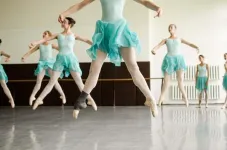(Press-News.org) BINGHAMTON, N.Y. -- Ballet training centers of Ukraine successfully resist co-optation by both neo-imperial and nationalist ideologies, forming robust and inclusive dancing communities that in many ways mirror structures of modern Ukrainian society, according to research from Binghamton University, State University of New York.
The signature Vaganova style of Soviet ballet can be described in a number of ways: exacting, athletic, classical, Russian. It’s also uniform across post-Soviet training academies, including those based in now-independent Ukraine.
Training shapes bodies, and post-Soviet dancers still begin training young; students at the Kyiv State Choreographic College in Ukraine range from 10 to 17 years old. But if you’re imagining an authoritarian structure with humorless, disciplinarian teachers, you’d be wrong.
During research at the Kyiv school, Binghamton University Research Assistant Professor Ania Nikulina heard instructors crack jokes, often with a touch of dark humor. Students smiled, laughed and even impersonated faculty during a silly end-of-year theatrical performance.
“There’s a very warm, family-like atmosphere at the school, and teachers are always there to help their students in a multitude of ways,” recalled Nikulina, who spent the spring and summer of 2018 at the school for the ethnographic portion of her doctoral research. “The teachers buy water for everyone and make dance shoes, things like that. People care about each other, especially in difficult times.”
And they were tough times indeed: Ukraine was already several years into its “hybrid” conflict with Russia, which began with Russia’s annexation of Crimea in 2013 and flamed into open warfare in 2022. Nikulina, a dance historian working with Binghamton’s Theatre and German and Russian Studies departments, explores the intersection of art and nation in “Ballet in Ukraine: From Uncertainty to Defiance and Independence,” recently published in Dance Research Journal. She has an extensive background in dance herself; she trained and performed with different dance companies in various dance styles, including ballet, classical and lyrical jazz, and modern dance, in her Siberian hometown of Novosibirsk.
While classical art often transcends national identity, decisions about which productions to stage are shaped by the realities of funding, Nikulina noted. In places where the main funding authority is the state, performances may incorporate nationalistic themes and explore ideas of nation. Ballet dancers, in a sense, are already sacrificing their bodies for the state; they sustain physical injuries in the course of the art’s long and grueling training.
“Dance historians for at least the past two decades have found deep connections between political regimes and tensions and different dance cultures,” she said. “Dancers, of course, are cultural agents.”
In the Soviet Union, the Ministry of Culture sponsored classical dance and decided which productions would receive state support. That arrangement continued in post-Soviet Russia and Ukraine throughout the 1990s and early 2000s despite salary cuts and delays. When state funding lapses, as it has increasingly in Ukraine, then private institutions begin to fill the gap.
In addition to classical ballets, Ukrainian productions have relied on folk dance and narratives. Nikulina offered one example: the Ukrainian ballet Lileya. While it takes place in Imperial times, its protagonist is a girl whose rural community suffers from Russian aggression.
“There is a very deep coupling of subjectivity with different kinds of nationalistic stories that often feature resistance to Russian authorities,” Nikulina said. “When you’re dancing on stage, you will explore these scenarios. It might feel natural, when the time comes, to defend or criticize these narratives.”
Some ballet dancers have done just that: In the first days of the Russian invasion, they answered their nation’s call to arms and enlisted in military service to defend the homeland.
A tough time for artists
Even before the 2022 invasion, ballet dancers felt the strain of conflict. After all, working in a state-sponsored atmosphere, artists know where the funding comes from — and when funding doesn’t come through because the government needs to give priority to the Ministry of Defense.
National divisions aside, both Ukrainian and Russian dancers study the Vaganova method, which is highly sought-after in international ballet companies. During her interviews and observations at the Kyiv school, however, Nikulina realized that the Ukrainian approach has diverged from its Soviet predecessor. Individual attention and adaptation to student needs are the norm these days, as is humor.
“Students laugh out loud in classes and it seems like it relieves a lot of tension and pressure,” she said.
Teachers and students felt free to criticize state authorities, as funding deficits sometimes left the school without heating during the winter. And while teachers may have some nostalgia for the funding and extensive professional networks of the Soviet period, they don’t miss the Soviet regime or look to Russia as its successor state or as a new cultural capital, Nikulina observed.
Following the 2022 open invasion, many Ukrainian dancers evacuated to countries like Latvia, Lithuania, Poland and Germany to find work; during her ethnographic study, teachers highlighted their connections with international theaters and encouraged their students to head abroad.
“Successful students find jobs elsewhere, partially because of political instability, but also because Russian theaters are not as accessible or desirable to them as they were prior to the war,” Nikulina said. “Because of the revolutions in post-Soviet Ukraine and the hybrid warfare period that began in 2014 until the full-scale invasion, dancers became extra motivated to find positions elsewhere where it’s safe and where they can possibly bring their families.”
Working abroad, however, often means a reliance on short-term contracts with a dance company that can expire after three to six months. While that can be beneficial for dancers looking to escape war, it also leads to a different kind of stress when they consider their longer-term future, Nikulina said.
“For these dancers, instability is doubled: You have political influences such as hybrid warfare, revolution, and full-scale war, but also the particularities of the dance industry and its short-term contracts,” she said. “It’s very hard for artists right now.”
END
Dance and the state: Research explores ballet training in Ukraine
While adhering to the Soviet-era Vaganova method, Ukrainian dancers defend their national identity
2023-07-24
ELSE PRESS RELEASES FROM THIS DATE:
New study reveals why defense against brain corrosion declines in people with Alzheimer’s disease
2023-07-24
A new study by researchers at Case Western Reserve University revealed that the progression of Alzheimer's disease (AD) can be slowed by suppressing a specific protein in the brain that causes corrosion.
A main pathogenic initiator of AD and related dementias is oxidative stress, which corrodes the brain, called oxidative damage.
David E. Kang, the Howard T. Karsner Professor in Pathology at the Case Western Reserve School of Medicine and the study’s lead researcher, said they’ve identified for the first time a cause ...
Key to preventing HIV progression lies in the gut
2023-07-24
Restoring and improving gut health may be key to slowing HIV progression to AIDS, according to a new study by University of Pittsburgh infectious diseases scientists published today in the journal JCI Insight.
The animal study, which was performed with simian immunodeficiency virus (SIV), the monkey form of HIV, revealed that tackling only systemic immune activation and inflammation when attempting to control disease progression and comorbidities isn’t effective. Instead, treatments should target the root cause of those problems and focus on healing the gut.
“It ...
New studies show daily prune consumption supports cardiovascular health in aging population
2023-07-24
ROSEVILLE, CALIF. – July 24, 2023 – A pair of new studies presented as abstracts today at the American Society of Nutrition (ASN) annual meeting report that daily prune consumption has promising effects on several biomarkers related to cardiovascular health. Conducted in postmenopausal women and men 55 years and older, the studies reveal:
In men, long-term prune consumption improved HDL cholesterol and the total cholesterol to HDL ratio, while decreasing oxidative stress and the inflammatory biomarker C-reactive protein ...
Novel thermal sensor could help drive down the heat
2023-07-24
Excess heat from electronic or mechanical devices is a sign or cause of inefficient performance. In many cases, embedded sensors to monitor the flow of heat could help engineers alter device behavior or designs to improve their efficiency. For the first time, researchers exploit a novel thermoelectric phenomenon to build a thin sensor that can visualize heat flow in real time. The sensor could be built deep inside devices where other kinds of sensors are impractical. It is also quick, cheap and easy to manufacture using well-established methods.
According ...
Risk of forced labor is widespread in U.S. food supply, study finds
2023-07-24
Eliminating forced labor is a vital starting point for creating a just and sustainable food supply, but most of us don’t know much about the labor conditions involved in producing our food. It’s possible that the people who picked and processed some of the items on our dinner table worked in conditions that involved force, fraud, coercion, or debt bondage.
In a study published July 24 in Nature Food, researchers at the Friedman School of Nutrition Science and Policy at Tufts University and the University of Nottingham Rights Lab calculated the risk of forced labor across all aspects of the U.S. food supply, excluding seafood. They found that the majority of forced ...
Association of early-, middle-, and late-life depression with incident dementia
2023-07-24
About The Study: The results of this study of more than 1.4 million adult Danish citizens followed up from 1977 to 2018 suggest that the risk of dementia was more than doubled for both men and women with diagnosed depression. The persistent association between dementia and depression diagnosed in early and middle life suggests that depression may increase dementia risk.
Authors: Holly Elser, M.D., Ph.D., of the Hospital of the University of Pennsylvania in Philadelphia, is the corresponding author.
To access the embargoed study: Visit our For The Media website at this link https://media.jamanetwork.com/
(doi:10.1001/jamaneurol.2023.2309)
Editor’s ...
Study improves understanding of how bacteria benefit plant growth
2023-07-24
RIVERSIDE, Calif. -- Plants form alliances with microbes in the soil in which they grow. Legumes, for example, benefit from a symbiotic relationship with microbes that inhabit nodules in their roots and “fix” nitrogen in the atmosphere to make it available to promote the legumes’ growth. But are microbes always beneficial to plants? Or does competition between strains for plant access degrade the service the bacteria ultimately provide?
A team led by scientists at the University of California, Riverside, set up experiments to answer these questions and better understand the competition process. The researchers used a native ...
Association of social isolation with hospitalization and nursing home entry among older adults
2023-07-24
About The Study: Social isolation was significantly associated with higher odds of skilled nursing facility stays and nursing home placement during two years, but not with hospitalization, in this nationally representative study of 11,000 older adults. Efforts to deter or delay nursing home entry should seek to enhance social contact at home or in community settings.
Authors: Mary Louise Pomeroy, Ph.D., M.P.H., of Johns Hopkins University in Baltimore, is the corresponding author.
To access the embargoed study: Visit our For The Media website at this link https://media.jamanetwork.com/
(doi:10.1001/jamainternmed.2023.3064)
Editor’s ...
Consumption of soft drinks and overweight and obesity among adolescents in 107 countries and regions
2023-07-24
About The Study: The prevalence of daily consumption of soft drinks was associated with the prevalence of overweight and obesity among adolescent students in this study of 107 countries and regions. These results, in conjunction with other evidence, suggest that reducing soft drink consumption should be a priority in combating adolescent overweight and obesity.
Authors: Huan Hu, Ph.D., of the National Institute of Occupational Safety and Health in Kanagawa, Japan, is the corresponding author.
To access the ...
Excess death rates for Republican and Democratic registered voters in Florida and Ohio during pandemic
2023-07-24
About The Study: In this study evaluating 538,000 deaths in individuals ages 25 and older in Florida and Ohio between March 2020 and December 2021, excess mortality was significantly higher for Republican voters than Democratic voters after COVID-19 vaccines were available to all adults, but not before. These findings suggest that differences in vaccination attitudes and reported uptake between Republican and Democratic voters may have been factors in the severity and trajectory of the pandemic in the U.S.
Authors: Jacob Wallace, Ph.D., of the Yale School of Public Health in New Haven, Connecticut, is the corresponding author.
To ...
LAST 30 PRESS RELEASES:
Cost of copper must rise double to meet basic copper needs
A gel for wounds that won’t heal
Iron, carbon, and the art of toxic cleanup
Organic soil amendments work together to help sandy soils hold water longer, study finds
Hidden carbon in mangrove soils may play a larger role in climate regulation than previously thought
Weight-loss wonder pills prompt scrutiny of key ingredient
Nonprofit leader Diane Dodge to receive 2026 Penn Nursing Renfield Foundation Award for Global Women’s Health
Maternal smoking during pregnancy may be linked to higher blood pressure in children, NIH study finds
New Lund model aims to shorten the path to life-saving cell and gene therapies
Researchers create ultra-stretchable, liquid-repellent materials via laser ablation
Combining AI with OCT shows potential for detecting lipid-rich plaques in coronary arteries
SeaCast revolutionizes Mediterranean Sea forecasting with AI-powered speed and accuracy
JMIR Publications’ JMIR Bioinformatics and Biotechnology invites submissions on Bridging Data, AI, and Innovation to Transform Health
Honey bees navigate more precisely than previously thought
Air pollution may directly contribute to Alzheimer’s disease
Study finds early imaging after pediatric UTIs may do more harm than good
UC San Diego Health joins national research for maternal-fetal care
New biomarker predicts chemotherapy response in triple-negative breast cancer
Treatment algorithms featured in Brain Trauma Foundation’s update of guidelines for care of patients with penetrating traumatic brain injury
Over 40% of musicians experience tinnitus; hearing loss and hyperacusis also significantly elevated
Artificial intelligence predicts colorectal cancer risk in ulcerative colitis patients
Mayo Clinic installs first magnetic nanoparticle hyperthermia system for cancer research in the US
Calibr-Skaggs and Kainomyx launch collaboration to pioneer novel malaria treatments
JAX-NYSCF Collaborative and GSK announce collaboration to advance translational models for neurodegenerative disease research
Classifying pediatric brain tumors by liquid biopsy using artificial intelligence
Insilico Medicine initiates AI driven collaboration with leading global cancer center to identify novel targets for gastroesophageal cancers
Immunotherapy plus chemotherapy before surgery shows promise for pancreatic cancer
A “smart fluid” you can reconfigure with temperature
New research suggests myopia is driven by how we use our eyes indoors
Scientists develop first-of-its-kind antibody to block Epstein Barr virus
[Press-News.org] Dance and the state: Research explores ballet training in UkraineWhile adhering to the Soviet-era Vaganova method, Ukrainian dancers defend their national identity




